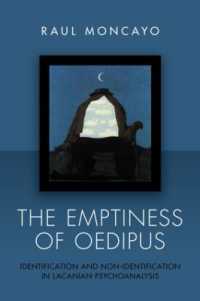- ホーム
- > 洋書
- > 英文書
- > History / World
Full Description
This is a study of the nature and operation of the Irish poor law system in the post-famine period. It traces the expansion of the system to encompass a wide range of welfare services, and explains the ideological and political context in which expansion took place.
The only local government bodies in rural areas to include elected members, poor law boards provided many Irish nationalists with their first experience of administrative power. As the influence of the nationalist guardians in the south and west grew, so the character of poor law administration in these areas began to change. Crossman explores the nature and significance of this process through detailed analysis of local decision-making and official actions, providing a new perspective on relationships between central and local administrators, welfare providers and welfare recipients, and the respectable and non-respectable. Topics covered include the politicisation of the welfare system, the relief of distress, the provision of labourers' cottages and the role of women in poor law administration.
Contents
Introduction
1. The poor law system in nineteenth-century Ireland
2. Poor law boards and the advance of Irish nationalism
3. Poor relief and the prosecution of the land campaign
4. Famine echoes: the relief of distress
5. Labourers' cottages: the poor law as an engine of social change
6. Domestic politics: women and poor law administration
Conclusion
Select bibliography
Index
-

- 電子書籍
- ザ・池沢早人師 サーキットの狼19<特…
-

- 電子書籍
- お飾り女王の二回目人生、処刑ルート→愛…
-

- 電子書籍
- Esquire The Big Bla…
-

- 電子書籍
- 嵐ノ花 叢ノ歌(2) RYU COMI…




